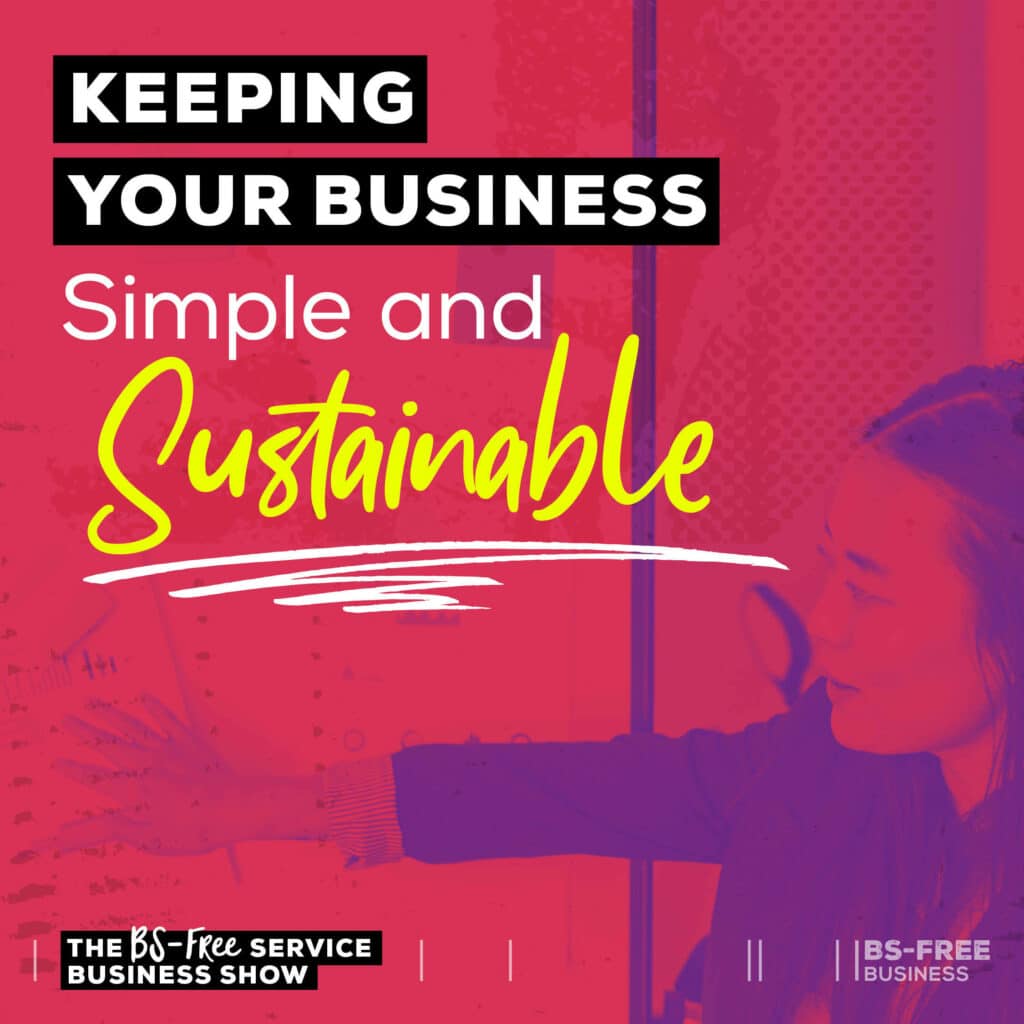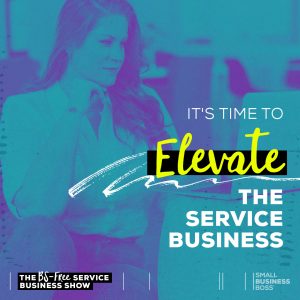
Search the site:
Keeping Your Business Simple and Sustainable (A Check-In)
Simplicity and sustainability are the cornerstones of having a business without the BS and that works for you. But making plans and decisions that can overcomplicate everything is far too easy. In this episode, I’m sharing six specific things to check in on before you start making big plans.
At this time of year, many of us start thinking ahead to what the next few months and possibly the next year have in store. That’s totally natural, but before you come up with words of the year and dream up new ideas, you need to check in on where things are really at in our business.
I’ve talked before about the phenomenon of entrepreneurial optimism, which is a big reason we have the drive and risk tolerance to be business owners in the first place. In running our business, we tend to have a positive outlook and an overly optimistic perception of how things are going.
This has been the case for me. And it’s not like I’m delusional, but I tend to focus on what’s going well and always want to focus on what’s next. I’m hardwired to find that motivating and exciting.
Optimism Can Result in Overlooking the Fundamentals
The challenge of that approach is that we can overlook the fundamentals, the foundational elements that ensure our business is simple and sustainable. Over time, I’ve learned that paying attention to the seemingly small things in my business results in some of the biggest wins.
I can quickly point to times when I was excitedly running after a new idea or project, but I was adding complexity and complications my business didn’t need. A great example of this is when, in 2015, I decided to launch my signature course.
I thought it was what I was supposed to do. What I didn’t realize at the time is that I was essentially building an entirely new type of business, when if I’d focused on the foundations of my business, I probably would have found a way to reach my goals in a much simpler way.
While the course wasn’t a bust by any means, I added a lot of time, money, and stress that I see in hindsight wasn’t necessary. I will share six areas you can (and should) check in on business-wise.
Each of these suggestions covers a foundational part of your business, and with the right time and attention, they can make a major impact on your time, money, energy, and more. Most of all, they’re designed to ensure your service business is simple and sustainable.
#1. Review Your Service Offerings
When was the last time you took the time to review all of your services? This is something we should be doing at least once per year as we need to evaluate what’s working and what’s not.
Consider how all your offers fit together if they’re what your target client really needs, along with how much time, effort and energy are required to deliver them.
If a service isn’t working, how can you refine it? Or maybe it’s time to retire it entirely.
And if a service is a sure-fire winner in your lineup, how can you do more of that in the coming months and years?
Finally, think carefully about what services you’re not offering, but there’s potential for you to expand your revenue or to reach new clients.
#2. Do a Profitable Pricing Assessment
Your pricing directly impacts your ability to reach your personal salary goals and is one of the most powerful tools you have as a service business owner.
First and foremost, you need to assess if your pricing is profitable. Review the pricing of each of your services in detail, including the time and hard costs required to deliver it to clients.
If the service is not as profitable as it needs to be, it’s time to adjust your pricing. This may be a matter of charging more for new clients or raising prices for existing ones.
As part of your profitable pricing assessment, I recommend you watch for cases of overservicing clients, scope creep, or other unbilled costs that eat into your profit.
#3. Analyze Your Lead Sources and Close Rate
One question I ask most new clients is where exactly their leads come from and how many of them turn into clients. The more data you can collect about the source of your leads, the more effective you’ll be at marketing your business.
Most service business owners rely heavily on referrals to find new clients. Still, the reality is that they don’t have an accurate breakdown of who is making those referrals and how many of them turn into clients.
If you’re not tracking this data right now, here’s what I recommend:
- How many leads you get per month and year
- Where exactly they came from
- How many turned into consult calls
- How many received proposals (if relevant)
- How many became clients
- And how much each one was worth
With this data, you can make better-informed marketing decisions as if you’re spending three hours per week on LinkedIn and have never got a client (or even a lead) from that platform, you probably don’t need to keep doing it.
Plus, having a firm grasp on your lead sources enables you to diversify and proactively work on generating new leads.
#4. Measure Marketing Performance
Closely associated with the lead source analysis is ensuring you’re measuring your marketing performance. The reality is that for service business owners, you have a minimal number of client spots at any given time, so you don’t need to do massive amounts of marketing.
That said, you need to be doing the proper marketing. Marketing that supports your business goals and reaches your audience. Case in point, if you’re focused on SEO-driven blogging, but you’ve been doing it for two years and have never had a client inquiry from your website, that may not be the correct tactic for you. But for you to make that call, you need to be not just tracking your lead sources but also regularly reviewing your SEO reports or Google Analytics.
Less is more when it comes to your marketing as a service business owner, so don’t add complexity by doing things that don’t matter.
#5. Audit Your Expenses
Part of keeping your business simple is ensuring that you’re able to keep your budget and your expenses under control. Expense bloat happens, which means this is the perfect time of year to audit all of your expenses.
Look for subscriptions you can cancel, tools you’re not using and services you may not need moving ahead. Understanding where you may be wasting money helps simplify things in a big way. Plus, having a sustainable business means you’re a good steward of your money.
#6. Check Your Capacity
Capacity is a never-ending challenge for every single service business owner, so it’s time to check on how things are going. If your time, energy and emotional capacity are always stretched to the limit, it’s tough to have a sustainable business.
Capacity is always a matter of balancing supply (as in how much capacity you have) and demand (how much is clamoring for your attention). A few of the most common capacity challenges to watch for in your business are:
- Having simply too many clients or projects on an ongoing basis.
- Packing your schedule to the hilt with work with no margin.
- Needing to be more accurate in how much time/energy work actually takes.
- Failing to assess your emotional or energetic needs accurately.
Capacity is something that I’m constantly talking about with my clients because it’s a moving target. There are countless strategies and tactics to address these challenges. However, you need to identify if you’re bumping up against capacity challenges before you can do anything about them.
Learning to manage all types of capacity in any given season is essential to keeping your work and life simple and sustainable.
Review and Reflect Before You Rush Ahead
To wrap things up, my challenge is to put this into action by carving out some time in the next week to review and reflect on the six prompts I shared in this episode. Then, use that info to help you reset before making fresh new plans.
And remember, if this isn’t a season for fresh and new things, you can 100% ask these questions at any time. Doing a check-in is an excellent way to ensure you’re not falling into the trap of over-complicating the simplicity of the service business model.


I’m Maggie Patterson (she/her), and services businesses are my business.
I have 20+ years of experience with client services, am a consultant for agency owners, creatives, and consultants, and vocal advocate for humane business practices rooted in empathy, respect, and trust.
Read or Listen to the Latest
For Solo Business Owners

Growing a solo service business is tough.
It’s even harder when you’re bombarded with BS advice that steers you away from your values and why you started your business in the first place.
This is the podcast for solo creatives and consultants who want to remain as a team of one and have zero interest in the hustle and grind of typical business teachings.
Subscribe now and never miss an episode.
For Micro Agency Owners
Most podcasts for agency owners obsess over revenue growth as the ultimate success metric.

But here’s the truth: not everyone wants to make millions. Your goal might be to build a sustainable business that lets you have a life and doesn’t run you into the ground.
Join me as I spill my shameless confessions and share everything I’ve learned about building a micro agency that skips the BS of tired and typical agency teachings.
Follow Now on All Major Podcast Platforms








